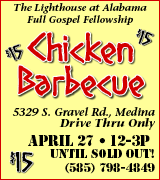New apples will be named on Thursday
Growers expect a premium price from new varieties

Photos by Tom Rivers – Roger Lamont, an apple grower and leader of NYAG LLC, holds an apple known as NY 2. The name for the new variety will be announced on Thursday in Geneva at the Agricultural Experiment Station.
ALBION – For about a decade, Roger Lamont has referred to them as NY 1’s and NY 2’s. But on Thursday, he will bury those names forever.
Two new varieties that Lamont has helped nurture from near infancy will be named. Each will have its own logo. Cornell University will make the announcement with a group of growers led by Lamont, who has been farming in Albion for a half century.
The announcement will be made in Geneva at the Agriculture Experiment Station. Lamont said the varieties are important to the future of the state’s $300 million apple industry. Orleans County is the state’s second-leading apple producer behind Wayne County.
New York is the second-ranked apple state in the country, trailing Washington, which is by far the dominant apple producer. Washington grows about 130 million bushels of apples a year, compared to 30 million in NY.
Washington’s output has NY growers looking for an edge in the marketplace.

Roger Lamont believes the new varieties, and more to be developed in the future, are critical for New York’s apple industry.
“We worry about being competitive with Washington because they grow five times what we do,” Lamont said. “These new varieties will be unique to New York.”
Lamont has served as chairman of New York Apple Growers LLC, an organization with about 140 members. They all paid for trees of the new varieties, and NYAG has developed a growing and marketing plan to ensure the new apples hit the marketplace in a coordinated way to ensure enough supply for consumers while growers can still make a good profit.
The new varieties are grown on 930 acres in apple-growing regions throughout the state. When the first mature crop hits the market in 2015 there will be about 930,000 bushels of the two varieties combined.
The trees are still young and aren’t yet producing a full crop. But there will be enough to introduce the varieties to the public through farm markets this year.
The New York Apple Growers are working with Cornell’s apple breeding company to make the new varieties exclusive to NY growers. Cornell will receive royalties from tree and fruit sales, and those funds will support the breeding program, helping to fund a pipeline of more new varieties in the future.

New York 1, whose parents are Honeycrisp and a selection called NY 752, has Honeycrisp’s juiciness but will be easier to grow for fruit farmers.
These will be the first “managed varieties” in NY. Cornell used to develop apples, and they were introduced in a haphazard manner. Growers didn’t work together on planning acreage or developing a marketing initiative for the varieties. That often meant new varieties were slow to catch on with the public. If a new apple proved to be a star, growers might then overproduce the variety, driving down the price.
The new varieties offer the prospect of a premium price. Lamont said growers have been looking for successors to the very popular Honeycrisp variety, which continues to command a high price despite a huge increase in production.
Consumers typically pay $50 to $60 a bushel for Honeycrisp, a very profitable price for growers. Many other varieties barely break even. The two new varieties will be priced at Honeycrisp levels.
Lamont believes both new varieties will be popular with consumers for the taste, and they will also be easier to grow than the finicky Honeycrisp.
Lamont has nurtured two apple varieties for about a decade, giving up land in his orchard to test how well they grow.
Both new apples will be red, although NY 1 will be a bi-color apple and not as red as NY 2.

New York II is a cross between Braeburn with Autumn Crisp. The new apple will be 95 percent red.
New York 1 is a cross between Honeycrisp and NY 752. The new spicy-sweet flavored apple has Honeycrisp’s juiciness and firmness, but doesn’t have that apple’s production problems. Honeycrisp can be vulnerable to seasonal pathogens that cause defects and the apple is tricky to store over winter.
New York 2 was developed by crossing Braeburn with Autumn Crisp. It has a sweet and tart flavor.
“It will be a shiny red apple,” Lamont said. “I call it a ruby red.”
He expects they will be a hit with consumers.
“We’re rolling them out as fast as possible,” he said. “If the marketplace demands it, we can always plant more.”










































































